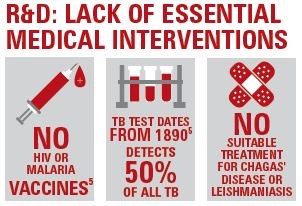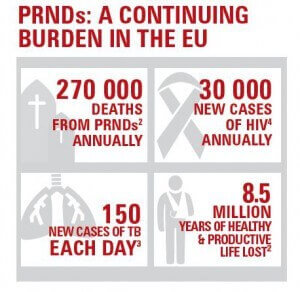In this post, Eoghan Walsh—communications officer at Deutsche Stiftung Weltbevoelkerung (DSW)—writes about the need for Europe to increase financial and political support for efforts aimed at creating new ways to tackle diseases such as HIV and AIDS, tuberculosis (TB) and malaria. This post originally appeared on the DSW blog on September 4.
Support for global health is at the core of DSW’s advocacy work. One of the four focus areas for the organization is to have global health policies and financing include and support sexual
and reproductive health and rights. We recognize at DSW the urgent need to improve the global health situation, and we continue to advocate for health
improvements in low- and middle-income countries. As part of this work, we are launching a series of policy briefs on the issue of global health research
and development (R&D), outlining why we need to increase financial and political support (in Europe) for efforts aimed at creating new ways to tackle diseases such as HIV and AIDS, TB, and malaria.
Download the new infographic on European investment in poverty-related and neglected tropical diseases now!

R&D for PRNDs
 A crucial element of European investment in global health is support for the development and distribution of innovative new interventions to tackle
head-on diseases that affect a huge number of people living in low- and middle-income countries. Poverty-related and neglected tropical diseases (PRNDs),
such as HIV and AIDS, TB and malaria—as well as 17 other infectious diseases identified by the World Health Organization (WHO )—affect more than one billion people around the world, causing 6 million deaths
annually.
A crucial element of European investment in global health is support for the development and distribution of innovative new interventions to tackle
head-on diseases that affect a huge number of people living in low- and middle-income countries. Poverty-related and neglected tropical diseases (PRNDs),
such as HIV and AIDS, TB and malaria—as well as 17 other infectious diseases identified by the World Health Organization (WHO )—affect more than one billion people around the world, causing 6 million deaths
annually.
90/10 gap
Because these diseases affect people living in some of the world’s poorest countries, for many years there has been insufficient investment in R&D
aimed at addressing and eradicating these diseases as the private sector has not seen a market interest in developing new medicines and treatments.
It is estimated that, overall, only 10 percent of the world’s resources for health research are directed at diseases that affect the poorest 90 percent of the world’s population.
Return on investment for Europe
 It is because of this “90/10” gap that
we work for increased political and financial support to global health R&D, supporting the creation of modern, effective, affordable, and accessible
medical interventions to bring an end to the suffering caused by PRNDs. As part of our new series of policy briefs on global health R&D, today
we are launching an infographic—developed in collaboration
with Policy Cures—outlining the value for the European Union (EU) in investing in global health R&D,
and how funding for global health R&D can have positive economic and health benefits for Europe as well as the rest of the world, and have significant
return on investment.
It is because of this “90/10” gap that
we work for increased political and financial support to global health R&D, supporting the creation of modern, effective, affordable, and accessible
medical interventions to bring an end to the suffering caused by PRNDs. As part of our new series of policy briefs on global health R&D, today
we are launching an infographic—developed in collaboration
with Policy Cures—outlining the value for the European Union (EU) in investing in global health R&D,
and how funding for global health R&D can have positive economic and health benefits for Europe as well as the rest of the world, and have significant
return on investment.
Read on and support us as we advocate for an end to these terrible
diseases!
Did you know?
- PRNDs account for 361 million years of healthy and productive life lost globally
- There are no vaccines for HIV or malaria
- The EU invested €2.1 billion in PRNDs research between 2007-2012
- Since 2000, 47 new products aimed at PRNDs have been registered, with over 350 more in the pipeline
Infographics provided by DSW.


 A crucial element of European investment in global health is support for the development and distribution of innovative new interventions to tackle
head-on diseases that affect a huge number of people living in low- and middle-income countries. Poverty-related and neglected tropical diseases (PRNDs),
such as HIV and AIDS, TB and malaria—as well as
A crucial element of European investment in global health is support for the development and distribution of innovative new interventions to tackle
head-on diseases that affect a huge number of people living in low- and middle-income countries. Poverty-related and neglected tropical diseases (PRNDs),
such as HIV and AIDS, TB and malaria—as well as It is because of this
It is because of this